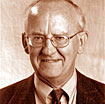Commentary on Psalm 99
I write these lines just after hanging up the telephone.
I admit to a frustrating situation. For more than two weeks now, I have been trying to get in contact with a minor local luminary to invite him to speak to a group of which I am a member. His dutiful secretary protects him: “He’s out of town. He’s been on vacation. I’m not allowed to give out his cell phone number.”
But I’m persistent. I see that I have made a dozen attempts to get in touch with him over these weeks. My patience is running out.
I call. He doesn’t answer.
Out of that frustrating experience I have now come to Psalm 99. And I am struck by the simple statement in verse 6. After citing instances of the Lord’s dealings with the people, with Moses, Aaron and Samuel, the psalmist says simply, “They cried to the Lord, and he answered them.” (verse 6) A bit later, the psalmist makes it more personal, now addressing God as “you”: “O Lord our God, you answered them…” (verse 8)
In the world of that day, it was not always assumed that a god would answer a call from that god’s people. The Old Testament writer delights in telling the story of the four hundred fifty prophets of Baal. They called on the name of Baal from morning until noon, crying, “O Baal, answer us!” The text continues, “But there was no voice and no answer.” They called. Baal did not answer (1 Kings 18:26).
Structure and Genre
Three declarations that the LORD is holy define the structure of the psalm. Verses 1-3 conclude, “Holy is he!” Verses 4-5 also conclude, “Holy is he!” Verses 6-9 conclude the entire psalm with “for the LORD our God is holy.”
As to genre, this is an enthronement psalm. There are two types of psalms associated with kingship in ancient Israel. The royal psalms are associated with events in the life of Israel’s king, such as a royal wedding (Psalm 45) or the installation of a new king (Psalms 2, 72, 101, 110).
There are seven psalms that speak of the Lord being acclaimed king at some sort of festival. These are called the enthronement psalms and include Psalms 47, 93, 95-99. Like the royal psalms, these enthronement psalms have to do with a king. However, in the royal psalms, the king is the king. But in the enthronement psalms, the Lord is King.
Reading the Psalm
A Note on the Meaning of “Holy”
The fundamental idea behind the Hebrew word qadosh which occurs three times in this psalm (verses 3,5,9) is apart or separate. A place where the Lord once appeared may be called “holy ground” (Exodus 3:5). Or a place where God is especially present may be described as a “holy temple” (Psalm 11:4; Habakkuk 2:20). In modern Israel to this day, a place of special significance is called a maqom qadosh or “holy place.”
Thus to say that God is holy is to stress the otherness or separateness of God. Isaiah saw the Lord and heard the angels singing “holy, holy, holy” (Isaiah 6:3). The twentieth-century theologian Karl Barth liked to speak of God as “wholly other.”
Yet, according to the Bible, the Lord has not cut off contact with humans but is active among them. Hosea put it this way, “I am God and no mortal, the Holy One in your midst” (Hosea 11:9). The fourth Gospel speaks the same way, “And the Word became flesh and lived among us” (John 1:14)
The King Who Is a Lover (99:1-5)
With verses 1-3, the emphasis is on the Lord’s might. God is imagined as enthroned in the heavens! The people’s reaction is to tremble in awe and wonder and to praise. The “cherubim” were part of the decorations of the Lord’s throne in the temple; in the psalmist’s eye they become winged creatures around the heavenly throne. The greatness of the Lord is the reason for the people to sing hymns of praise.
In verses 4-5, the emphasis is on the Lord’s mercy, expressed in concern for people on earth. God is a lover, a lover of justice, and sees to it that justice is established in “Jacob,” that is, in Israel. Here the reason for the people to sing praises is God’s love for justice.
The God Who Answers (99:6-9)
The emphasis in verses 6-8 is on the nearness of this holy God, responding to the cries of a people in distress. Moses and Aaron bridged the gap between God and people at the time of the Exodus. They called on the Lord for help and the Lord answered (Exodus 4, 5-11). Samuel called on the Lord for help and the Lord answered (1 Samuel 7:7-11; 12:16-18). Verse 8 says simply, “Lord, you answered them and forgave them.” This is a reason for praise (verse 9) and an invitation for the people praying this psalm to call upon the Lord to receive help and forgiveness.
Toward a Sermon on this Psalm
The sermon could be an occasion to follow the suggested “We call, God Answers” theme. The preacher could speak about prayer, following the three-part structure of the psalm.
But this psalm is assigned to the day celebrating the Transfiguration of Jesus. The story of the psalm could be told, centering on the three “Holies,” as a background to the transfiguration story. The point is that God remains King, powerful and mighty. But God also is a lover of justice and righteousness who cares about justice and righteousness on earth. The mysterious events of the transfiguration provide assurance that this Jesus is indeed God’s Son, sent to humans as the chosen representative of the King, to establish God’s rule on earth.


February 14, 2010